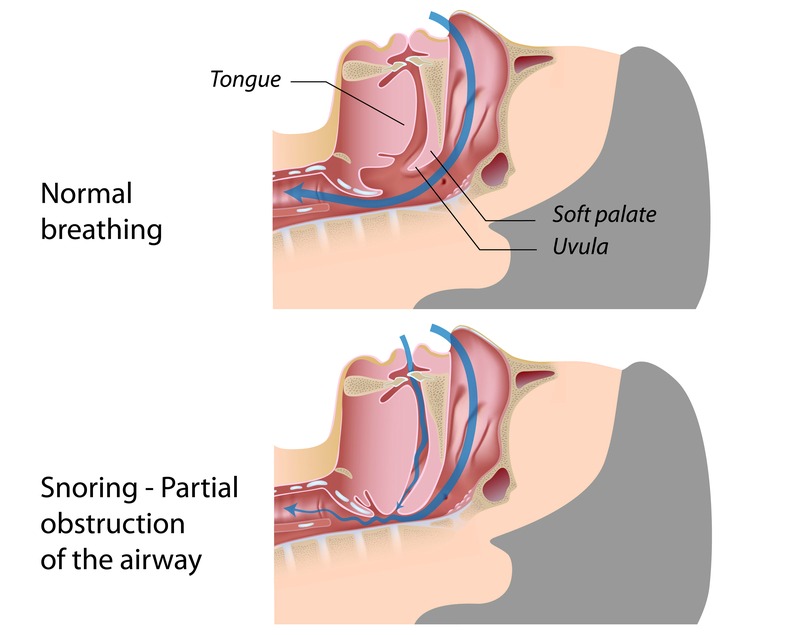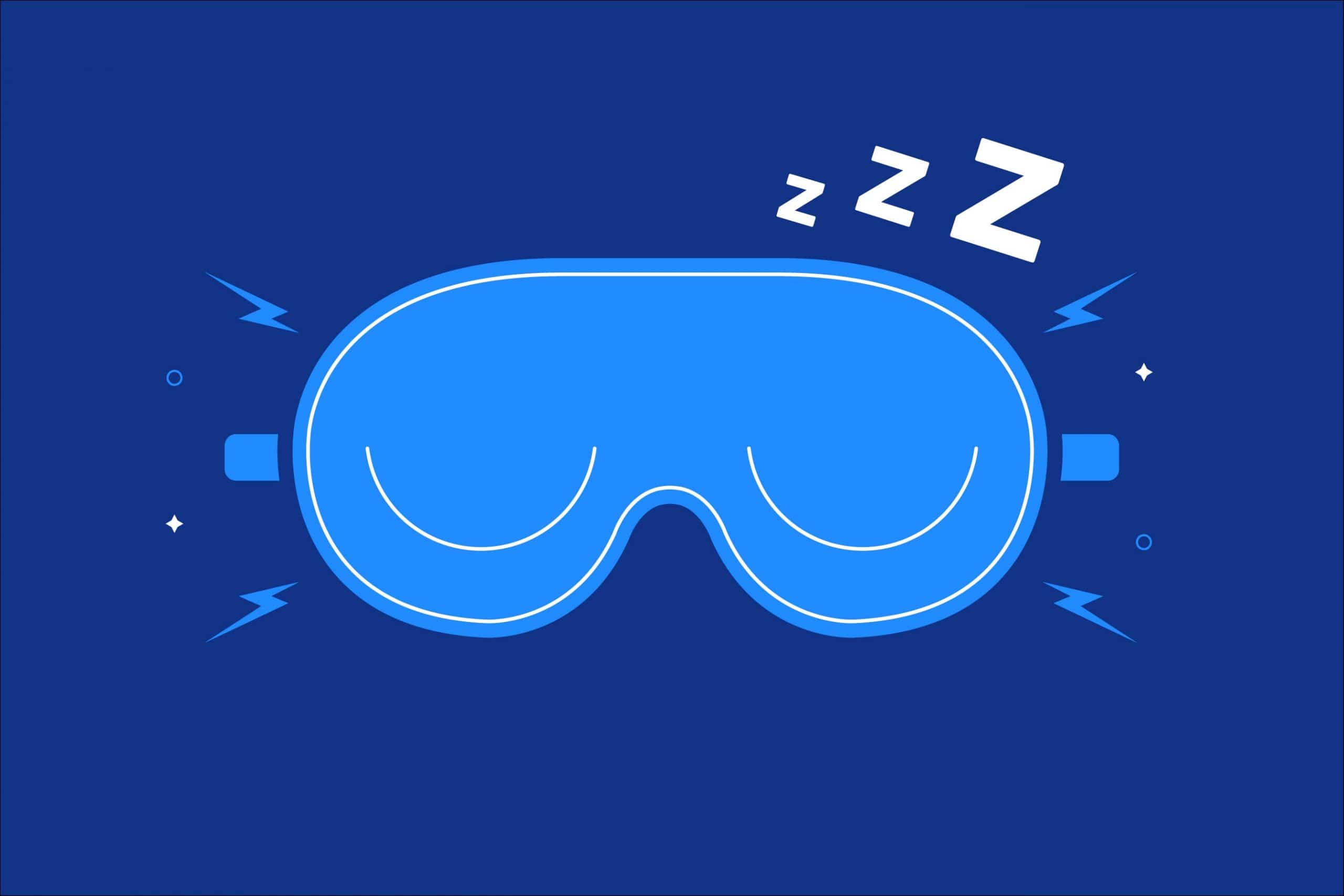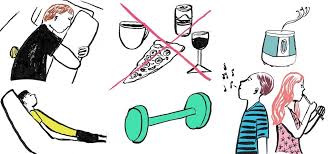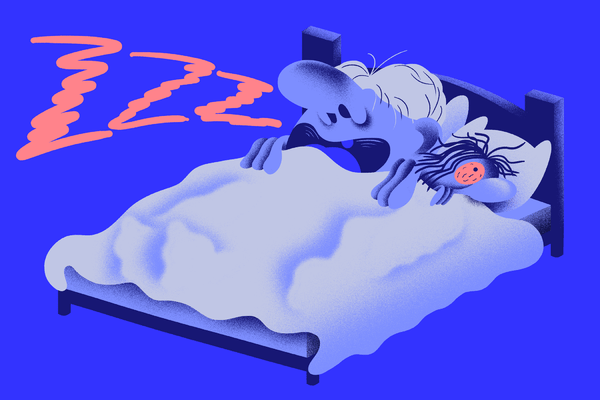We all know the struggle of being woken up by a loud snoring sound coming from your partner during the night. It’s not just annoying, it can also be very dangerous for both partners’ health. This article will explore different causes and treatments for snoring (how to stop snoring) so that you can get some sleep, have less stress, and improve your relationship with your partner!
Contents
What Is Snoring?

Snoring is a noise created by the airflow which passes through your nose and mouth during sleep. It’s caused when you relax certain parts of your throat muscles, which then narrows the airway and causes vibration as you breathe out. The more relaxed these muscles are, or depending on how much they’re constricted, to begin with (which we’ll get into later), the more they vibrate and make noise. A similar sound can be heard when someone is choking or gasping for breath, but with snoring, it happens as you sleep!
What Causes Snoring?
Snoring has many causes, which are divided up by their root cause:
- Anatomical issues (the way your face, throat, tongue, etc. are built),
- Medical issues (any health problems you have which can cause snoring),
- Environmental causes of snoring,
- Lifestyle factors that may be causing the problem
Anatomical Issues
Let’s start with anatomical causes! The most common one is simply having a big neck relative to your jaw size- this creates an excessively large airway for your tongue to fall back into and obstruct airflow. Other anatomical causes can include having a deviated septum, enlarged tonsils or adenoids, an elongated uvula (the dangly bit at the back of your throat), and even a recessed chin.
Medical Issues
Medical issues which can cause snoring are numerous and varied, but they’re all more common in older people (so you know, that’s not an excuse for younger snorers to slack off!). Some of them include sleep apnea where breathing stops temporarily during sleep and oxygen levels drop; heart failure which can cause fluid buildup around the lungs; high blood pressure causing your windpipe to become swollen- the list goes on!
Environmental Causes
Environmental causes of snoring are things that can temporarily or chronically obstruct your airway while you sleep. This includes allergies which cause the nasal passages to swell and close up, smoking (duh), drinking alcohol, and even having a cold or flu.
Lifestyle Factors
Lifestyle factors that may be causing your snoring can be anything from being overweight to sleeping on your back. When you’re lying on your back, gravity pulls everything in the direction of your neck- including your tongue, soft palate, and uvula. This increases the chances that they’ll fall backward and obstruct your airway.
Types Of Snoring And What It May Indicate

Snoring can be classified into five main types, depending on how it’s created. Here are the different kinds of snorers and what they may indicate:
Whispered Snoring
Your natural breathing is obstructed by your throat being too relaxed or constricted to let air through easily. This happens when you fall asleep with a full stomach, after drinking alcohol, or when you’re congested from a cold.
Stridor Snoring
This is caused by air passing through an obstruction in the throat, such as swollen tonsils, adenoids, a deviated septum, etc. It’s often accompanied by a high-pitched noise and can be very loud.
Mixed Snoring
This is a mix of whispered and stridor snoring. It’s the most common type of snoring.
Central Snoring
This happens when your brain fails to send airway-opening signals to your muscles while you sleep, which means that no noise is made despite airflow being blocked. If this sounds like something out of science fiction, it just means that you’re sleeping so deeply that even though you’re snoring, you don’t realize it!
Obstructive Sleep Apnea (OSA)
All the types before this one are considered to be mild or moderate forms of sleep apnea. But OSA occurs when your airflow stops completely for at least ten seconds while you’re asleep. It’s often accompanied by snorting and choking, which wakes you up. It’s a serious condition that can lead to high blood pressure, heart disease, and even death if untreated!
Risks Associated With Snoring

Snoring is more than just a pesky noise- it can have some serious risks associated with it if left untreated. These include:
- Daytime sleepiness which can lead to accidents at work or while driving,
- Poor quality of sleep can lead to irritability, lack of concentration, and memory lapses- you’ll feel tired even after a good night’s sleep.
Heart Disease And Stroke Risk
People who snore are at increased risk of developing heart disease in the future. Due to the extra strain, it puts on your cardiovascular system (this is more common if you also have OSA). Snoring can also increase your risk of having a stroke, especially if you have OSA.
Complications During Pregnancy
Pregnant women who snore are at an increased risk of developing high blood pressure and other complications during their pregnancy. Babies born to mothers who snore are also more likely to be premature or have low birth weight.
In Short
- First and foremost is the fact that it can seriously impair your quality of sleep, leading to daytime drowsiness, irritability, poor concentration, and even accidents.
- Second is the increased risk of developing high blood pressure, heart disease, or stroke– all of which are linked to OSA.
How To Stop Snoring?
Here is a list of tips that you might try out:
Self-help Tips To Stop Snoring
There are many self-help tips for stopping snoring, including:

- Losing weight (obviously),
- Avoiding alcohol and sedatives before bed,
- Sleeping on your side rather than your back,
- Keeping a regular sleep schedule,
- Avoiding caffeine and heavy meals in the evening, and
- Staying hydrated
Bedtime Remedies To Help You Stop Snoring
There are also a few bedtime remedies you can try to help stop snoring.
- Using a humidifier in your bedroom,
- Putting a tennis ball in the back of your shirt to keep you from sleeping on your back, and
- Wearing a mouth guard or nasal strips while you sleep
Six Anti-Snoring Throat Exercises
There are a few simple exercises you can do to help keep your throat muscles toned and reduce the risk of snoring.
- Gargle with warm water- this helps to loosen any mucus or phlegm in your throat.
- Pucker up like you’re going to kiss someone- hold for 30 seconds, then relax.
- Push your tongue against the roof of your mouth with your jaw clenched- hold for five seconds, release and repeat ten times.
- Cup both hands behind your back and exhale slowly through pursed lips like you’re fogging up a mirror- this will help strengthen the throat muscles which are responsible for snoring.
- Swallow a teaspoon of honey- this will help soothe and moisten your throat.
Lifestyle Changes To Help You Stop Snoring
There are a few simple lifestyle changes you can make to help reduce the amount of snoring you do at night.
- Quit smoking- cigarettes irritate the lining of your throat and increase the likelihood of snoring.
- Avoid drinking alcohol- it relaxes the muscles in your throat, making it more likely that you’ll snore.
- Get regular exercise- this helps to keep your body healthy overall and can also improve sleep quality.
- Stay hydrated- dehydration can cause mucus build-up which can lead to snoring.
Medical Treatment For Snoring
If self-help tips and bedtime remedies don’t help, it’s time to seek medical treatment for your snoring.
There are many different treatments available, depending on the cause of your snoring.
If you have sleep apnea, for example, you may require a CPAP machine to help keep your airways open while you sleep.
Snoring And Your Relationship

If your partner is constantly being kept awake by your snoring, it’s no wonder that it can be a source of tension in your relationship! Not only do you have to deal with the annoyance and fatigue of sleep apnea, but now you’re also keeping your partner up at night. It’s important to communicate openly with your partner about how you’re feeling and the steps you’re both taking to try and fix the problem.
Communicating With A Partner Who Snores
If your partner is snoring, it’s important to start by talking with them about the problem. Let them know how it makes you feel and encourage them to do something about their constant snoring. There are a few options for treatment they can try, so help support each other as a team to get relief from this condition together.
Dealing With Complaints About Your Snoring
If you’re the one who’s constantly being kept up at night by your partner’s snoring, it can be difficult to deal with complaints about the noise. Try not to take them personally- remember that your partner is just as frustrated and exhausted as you are. Instead, focus on finding a treatment that will help reduce the snoring and finally get you both some restful sleep.
Conclusion
Snoring can be a frustrating and downright annoying problem to deal with, but there are many different ways to treat it. By trying a combination of self-help tips, bedtime remedies, and medical treatment, you’re sure to find relief from snoring and finally get the sleep you deserve.
For more information, please contact MantraCare. Sleep is an essential part of our daily routine and it plays a significant role in maintaining a healthy body and mind. If you have any queries regarding Online Insomnia Counseling experienced therapists at MantraCare can help: Book a trial therapy session


